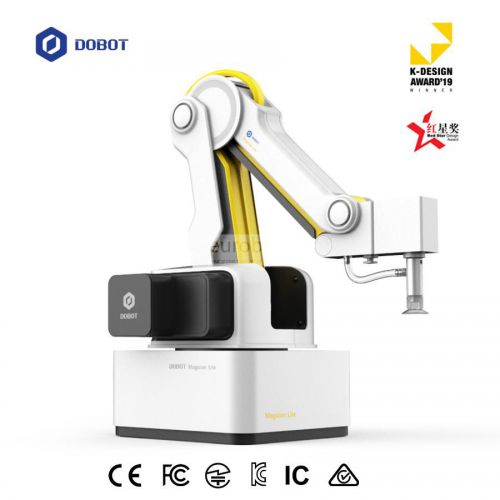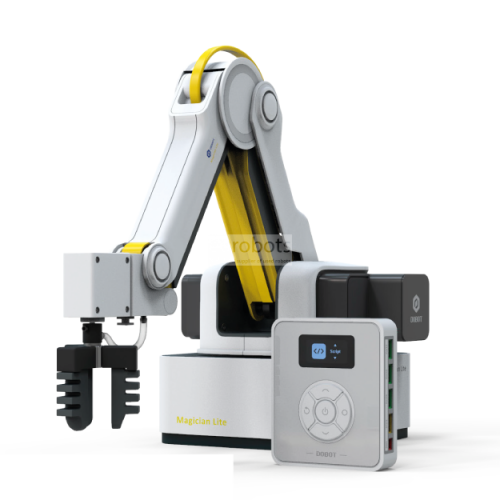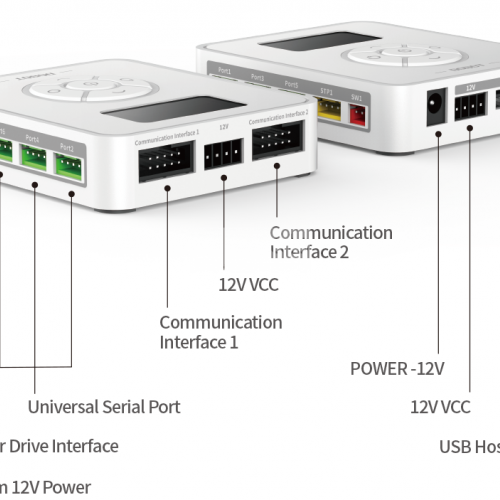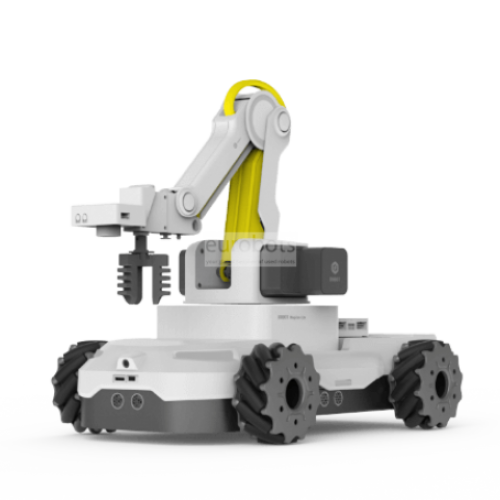Dobot magician lite educational
The Magician Lite is a lightweight and intelligent robotic arm designed specifically for K12 education. It offers students a wide range of possibilities for interaction, utilizing software, hardware, and expansion interfaces to unleash their creativity. By engaging in the process of building and playing with the Magician Lite, students gain hands-on experience and knowledge about AI and robotics. They are introduced to the fascinating world of robotics and learn how robots can be applied in real-world scenarios.
The Magic Box serves as the external control unit for the Magician Lite, responsible for handling programming tasks. It boasts 12 communication interfaces, supports Bluetooth connectivity, and is compatible with various accessories, enhancing the versatility of the robotic arm.
Comprehensive robotics courses are available for students, structured in a chapter-by-chapter format to facilitate their learning journey. These courses introduce programming and robotic skills to young learners, equipping them with essential knowledge for future success. Additionally, optional kits such as drawing, industrial 4.0, AI vision, and sensor kits are available, providing students with further opportunities for creativity and exploration.
The Magician incorporates drag-to-teach programming feature and offers multiple programming options, including a graphical interface for intuitive operation, graphical block programming (like scratch), scripting using programming languages like LUA, and compatibility with various APIs such as C, C#, Python, Kotlin, and more, making it accessible for users of all skill levels to learn and master the operation of the robot.
| DOBOT Magician Lite | |
| Degree of Freedom | 4 |
| Maximum Load | 250 g |
| Max Reach | 340 mm |
| Repeatability | ±0.2 mm |
| Voltage | 100V - 240V AC,50/60 Hz |
| Power Input | 12V ~ 5A DC |
| Working Environment | -5° ~ 45° C |
| Power | 60W Max |
| Communication | USB Virtual Serial Port / Serial Port |
| Software | DobotStudio/DobotLab |
| Weight | 2.4 KG |
| Rear Arm / Forearm | 150 mm |
| Base Size | 146 mm x 146 mm |
| Axis Motion | |
| Axis 1- Base | -135° to +135° |
| Axis 2- Rear Arm | -5° to +80° |
| Axis 3- Fore Arm | -10° to +85° |
| Axis 4- End Tools | -145° to +145° |
| J1-J3 Max speed | 300°/s |
| J4 Max speed | 200°/s |
| Magic Box | |
| MCU | ARM 32-bit Cortex-M4 |
| Main Frequency | 168 MHz |
| Voltage | 100V - 240V AC,50/60 Hz |
| Power Input | 12V ~ 5A DC |
| Working Environment | -5° ~ 45° C |
| Power | 60W Max |
| Communication | USB Virtual Serial Port/Serial Port/Bluetooth |
| Programming Language | MicroPython |
| Software | DobotStudio/DobotLab |
| Weight | 98 g |
| Size | 95 mm x 80 mm x 21.5 mm |
| End Tools | |
| Pen Holder | Pen Diameter: 8-12 mm |
| Suction Cup | Built-in air pump drive works under negative pressure, with suction cup diameter of 10mm, 20mm |
| Soft | Built-in air pump drive works under positive and negative pressure, with maximum opening and closing |
| Gripper | distance of 50 mm |
| Expansion Interface | ||
| Power Interface | 2 | 4PIN, 12V~3A DC |
| Multi-Functional Communication Interface | 2 | 10PIN, Serial Communication Interface |
| I/O Interface | 6 | Green Terminal, 4PIN, 3.3V/5V-IO, 5V 1A-VCC, Multi-Function Multiplexing Interface, User-Defined I/O, AD, PWM Output, I2C, etc |
| Stepper Motor Interface | 2 | Yellow Terminal, 4PIN, 2-Phase Stepper Motor, 16 Subdivision, 12V 1A |
| 12V Power Interface | 2 | Red Terminal, 2PIN, 12V, 3A Max |
| AI Camera Kit | |
| Dimensions | 50mm*44mm*25mm |
| CMOS | 1/4inch |
| Image pixels | 1M |
| Image Format | YUV/MJPG |
| Data Format | 240*320. 640*480. 1280*720 |
| Maximum Image Transfer Rate | 1280*720@30fps |
| Camera Control | Saturation,Contrast, Acutance |
| White balance | Auto |
| Exposure | Auto |
| Working Temperature | 0℃ to +50℃ |
| Operating voltage | DC 5V |
| Interface | USB2.0 |
| Voice input | Integrated microphone |
| Feature | All-in-one design, integrated microphone, distortion-free lens |
| Camera working angle | 0°-135° |
| Function | Face recognition, image recognition, OCR text recognition, speech recognition, etc. |
Applications
Pictures
Videos
Diagrams

 English
English
 Germany
Germany
 France
France
 Russia
Russia
 China
China
 Argentina
Argentina
 Portugal
Portugal
 Colombia
Colombia
 Italy
Italy
 India
India
 Brazil
Brazil
 Japan
Japan
 Mexico
Mexico
 Turkey
Turkey
 Ukraine
Ukraine
 Peru
Peru
 Sth. Africa
Sth. Africa





